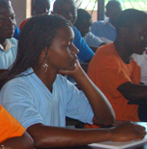The Need
“It will be extremely difficult — perhaps even impossible — for Africa to compete effectively in a world increasingly dominated by knowledge and information unless it consciously, persistently and vigorously overhauls its potential and its most crucial institutions: its universities.”
Damtew Teferre and Philip Altbach
African Higher Education: Challenges for the 21st Century
The Republic of Angola recently celebrated the 5th anniversary of the signing of a peace agreement that ended nearly 30 years of devastating civil war. During that war, nearly a million Angolans died of war related causes. One half million people fled the country; over four million others were displaced. Larger areas of the interior were cut off from government services and much of the infrastructure was destroyed or abandoned. It is estimated that as many as 7 million landmines remain planted in Angolan soil. Clearly, this country has emerged from the civil war with profound challenges for the redevelopment of its infrastructure and its educational system.
Angola is a country rich with natural resources — petroleum, diamonds and gold. As a result, many multinational corporations have located in Angola. Most of these corporations prefer to hire expatriates with educational background that meet their requirements. This practice not only creates tension between Angolan citizens and expatriates, it also has a negative effect on the economy. Empowering Angolans with higher education and English as an international language of business will enable them to compete in their own country and in the global economy.
The population of Angola nears 12,130,000 (July 2006 estimate) yet there are only seven universities to educate its people. The seven universities are Universidade Agostinho Neto, Universidade Católica de Angola, Universidade Jean Piaget de Angola, Universidade Lusiada de Angola, Instituto Superior Provado de Angola, Universidade Nova de Angola and Benguela University.
Increasing the availability of higher education is critical for the future of Angola. According to Guerra Freitas, President of SHAREcircle, “Many brilliant young people from poorer families who graduate from high schools in Angola do not have a hope of ever attending a university because of the cost and lack of availability. This not only weakens their potential to live fulfilling lives, but diminishes their potential to becoming assets to the development process of Angola.” Mrs. Josefina Pitra Diakité, Angola’s Ambassador to the United States, said during her meeting with Guerra Freitas in Washington D.C., “Because the very few individuals from most provinces do not go back to their home provinces after they graduate, we face a brain drain within the country.” Moreover, Fancisco Basili, Angola’s Head of Education for UNICEF, tells us, “No sector of society has more influence on other areas than education. It is the key to the fulfillment of other human rights. It is at the heart of all development.” Two public policies pave the way for accelerated growth in higher education: permission and encouragement for the establishment of private institutions of higher education and the recent Cabinet Council approval for a plan to improve the higher education subsystem of the country.
“It is time to turn the battlefields into fields of production and knowledge.”
Angola Minister of Education, Antonio Burity da Silva ‘ 2003
Nowhere in Angola has the effect of civil war been felt more than in Bié Province, located in the center of the country. All infrastructures in Bié, including schools were destroyed. After the end of the civil war in 2002, the government of Bié quickly rebuilt most of the infrastructure as well as elementary and secondary education schools. Previously, secondary schools in the interior provinces — like Bié — had been few in number. Where they did exist, they were most often located in the provincial capitals. Today, Bié is the only province in Angola with a high school in each of its nine municipalities. The presence of these schools yields a population that has the preparation necessary for a university education.
The seven Angolan universities previously mentioned are located along the Angola’s west coast far from potential students in Bié. According to the government of Bié province, 99.9% of Bié graduates cannot pursue higher education due to the lack of universities in Angola and in Bié specifically.
Bié needs a university to provide critically needed higher education opportunities and viable career avenues for Angola’s most promising young people. The presence of a university will also accelerate Bié�s economic development and offer Angolans valuable, sustainable skills and the knowledge needed to be leaders in their community and successful in the growing Angolan economy.
With the help of partners, coalitions and funders, SHAREcircle will establish this much needed University in Bié.



 Empowering Angolans with higher education and English as an international
language of business will enable them to compete in their own country
and in the global economy.
Empowering Angolans with higher education and English as an international
language of business will enable them to compete in their own country
and in the global economy.